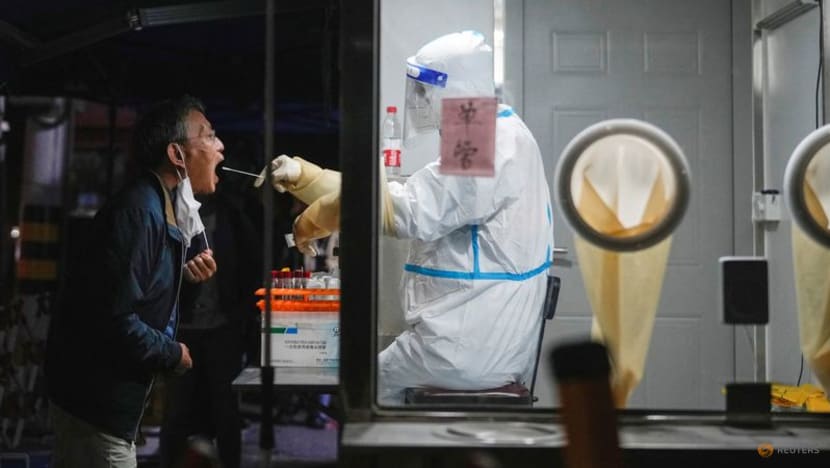Chinese cities, from Wuhan to Guangzhou, tighten COVID-19 curbs

A medical worker in a protective suit collects a sample from a resident for nucleic acid testing, following the COVID-19 outbreak in Shanghai, China, on the day of the opening session of the 20th National Congress of the Communist Party of China on Oct 16, 2022. (File photo: Reuters/Aly Song)
BEIJING: Chinese cities from Wuhan in central China to Xining in the northwest are doubling down on COVID-19 curbs, sealing up buildings, locking down districts and throwing millions into distress in a scramble to halt widening outbreaks.
China on Thursday (Oct 27) reported a third straight day of more than 1,000 new COVID-19 cases nationwide, a modest tally compared with the tens of thousands per day that sent Shanghai into a full-blown lockdown earlier this year but enough to trigger more curbs and restrictions across the country.
China's coronavirus case load has remained small by global standards, but its ultra-strict and disruptive containment measures this year against the highly transmissible Omicron variant have weighed heavily on the world's second-largest economy and rattled financial markets.
Guangzhou, China's fourth-biggest city by economic output and the provincial capital of Guangdong, on Thursday sealed up more streets and neighbourhoods and kept people in their homes as new areas were deemed high-risk in a COVID-19 resurgence that persisted into its fourth week.
Wuhan, site of the world's first COVID-19 outbreak in late 2019, reported around 20 to 25 new infections a day this week. Nevertheless, local authorities ordered more than 800,000 people in one district to stay at home until Oct 30.
"It's already the third year and things are still like this," Wuhan resident Joy Dai, who works in the tourism sector, told Reuters.
"It affects me both mentally and physically ... But I'm helpless in all of this so I've learned to accept it."
Wuhan Union Hospital suspended outpatient services after a member of staff at a canteen tested positive, the hospital said in a release. Universities in Wuhan also reverted to online teaching.
Wuhan also suspended the sale of pork in parts of the city, according to images and posts on social media, after one COVID-19 case was found that authorities said was linked to the local pork supply chain.
In Xining, the capital of Qinghai province, social media posts told of food shortages and price inflation for essential goods as health authorities in the city of 2.5 million people raced to contain a COVID-19 rebound following the week-long National Day holiday in early October.
"To reduce the risk of transmission, some vegetable and fruit stores have been closed and put under quarantine," said a Xining government official on Wednesday.
Other large cities across China including Zhengzhou, Datong and Xian have implemented new curbs this week to rein in local outbreaks.
In Beijing, the Universal Resort theme park was shut on Wednesday after at least one visitor tested positive for the coronavirus. The theme park did not indicate when it would reopen but said it would refund or reschedule tickets.
"We will continue to assess the impact on operations and strive to resume operations as soon as possible," it said on the Weibo social media platform.
The theme park is 30 per cent owned by Comcast's Universal Parks & Resorts and 70 per cent by state-owned Beijing Shouhuan Cultural Tourism Investment.
China has repeatedly vowed to stick to its zero-tolerance response to COVID-19 and implement what the authorities say are necessary measures to contain the virus.
BOOKMARK THIS: Our comprehensive coverage of the COVID-19 pandemic and its developments
Download our app or subscribe to our Telegram channel for the latest updates on the coronavirus outbreak: https://cna.asia/telegram














